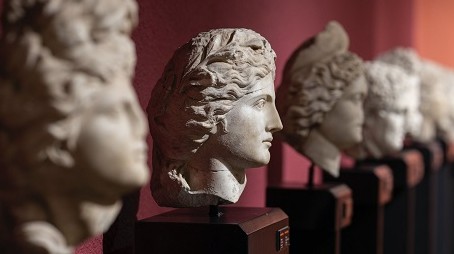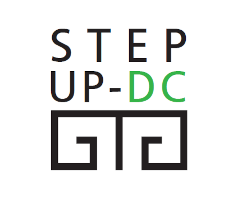Session 7C, History in SE-NKUA
STEPUP-DC Project

Course DescriptionBasic Topics
- The development of historical consciousness and metahistorical skills
- History teaching methods which implement EDC/HRE education
Duration
The duration of the session is 9 hours (3 reading+3 learning+3 working/practicing)
Objectives
- Develop students’ confidence in leading initiatives and developing educational programs on EDC/HRE/IE.
- To establish a firm understanding of how the teaching of history can promote democratic competences, employing different teaching approaches
Learning outcomes
- Identify debates and trends in history teaching which can be associated with EDC/HRE, such as historical consciousness and the development of metahistorical skills
- identify which history teaching methods enable students to develop attitudes, values and skills associated with EDC/HRE
- develop different teaching approaches to historical content so as to develop historical skills, critical understanding and historical consciousness
Outcomes and CDC
- Knowledge and critical understanding:
- Knowledge and critical understanding of culture, cultures, religions
- 1812: Can reflect critically on how his/her judgments are influenced by his/her own cultural affiliations
- Knowledge and critical understanding of politics, law and human rights
- Key 130: Can describe the diverse ways in which citizens can influence policy
- Knowledge and critical understanding of culture, cultures, religions
- 2025: Can explain why all cultural groups are constantly evolving and changing
- 2026: Can explain why all cultural groups are internally variable, diverse and heterogeneous
- Key 132: Can explain why there are no cultural groups that have fixed inherent characteristics
- Knowledge and critical understanding of history, media, economies, environment and sustainability
- Key 134: Can reflect critically on how histories are often presented and taught from an ethnocentric point of view
- 2051: Can reflect critically on the fluid nature of history and how interpretations of the past vary over time and across cultures
- 2054: Can outline diverse narratives from different perspectives about the historical forces and factors that have shaped the contemporary world
- 2055: Can reflect critically on processes of historical investigation
- 2058: Can reflect critically on the connections between economic, social, political and environmental processes
- Values
- Valuing cultural diversity
- 205: Argues that one should try to learn from one another in order to deepen understanding of both one’s own and other people’s backgrounds
- Attitudes
- Tolerance of ambiguity
- Key 55: Expresses a desire to have his/her own ideas and values challenged
- Respect
- 508: Expresses respectful attitudes towards other people who differ from himself/herself
- Openness to cultural otherness
-
Key 23: Expresses curiosity about other beliefs and interpretations and other cultural orientations and affiliations
- Skills
- Autonomous learning skills
- 1012: Develops own ideas by gathering information
- Analytical and critical thinking skills
- 1102: Uses evidence to support his/her opinions
- 1111: Can analyse alternative points of view
- 1143: When it comes to solving a problem, he/she thinks about all of the things that are part of the problem before deciding what to do
- 1116: Can construct a logical and defensible argument for or against a particular interpretation
- 1117: Can evaluate arguments, claims and beliefs
- 1121: Can analyse evidence when evaluating an argument
- 1138: Can employ various types of reasoning (inductive, deductive, etc.) as appropriate
-
Key 68: Can identify any discrepancies or inconsistencies or divergences in materials being analysed
- 1141: Can analyse the motives, intentions and agendas of the people who produce propaganda, stereotypes, intolerance and hate speech in the mass media (e.g. newspapers, TV)
- 1142: Can draw the results of an analysis together in an organised and coherent manner to construct logical and defensible conclusions
- Empathy
- 1315: Can describe accurately the emotions, feelings and needs of other people
- The development of historical consciousness and metahistorical skills
- History teaching methods which implement EDC/HRE education
The duration of the session is 9 hours (3 reading+3 learning+3 working/practicing)
- Develop students’ confidence in leading initiatives and developing educational programs on EDC/HRE/IE.
- To establish a firm understanding of how the teaching of history can promote democratic competences, employing different teaching approaches
- Identify debates and trends in history teaching which can be associated with EDC/HRE, such as historical consciousness and the development of metahistorical skills
- identify which history teaching methods enable students to develop attitudes, values and skills associated with EDC/HRE
- develop different teaching approaches to historical content so as to develop historical skills, critical understanding and historical consciousness
- Knowledge and critical understanding:
- Knowledge and critical understanding of culture, cultures, religions
- 1812: Can reflect critically on how his/her judgments are influenced by his/her own cultural affiliations
- Knowledge and critical understanding of politics, law and human rights
- Key 130: Can describe the diverse ways in which citizens can influence policy
- Knowledge and critical understanding of culture, cultures, religions
- 2025: Can explain why all cultural groups are constantly evolving and changing
- 2026: Can explain why all cultural groups are internally variable, diverse and heterogeneous
- Key 132: Can explain why there are no cultural groups that have fixed inherent characteristics
- Knowledge and critical understanding of history, media, economies, environment and sustainability
- Key 134: Can reflect critically on how histories are often presented and taught from an ethnocentric point of view
- 2051: Can reflect critically on the fluid nature of history and how interpretations of the past vary over time and across cultures
- 2054: Can outline diverse narratives from different perspectives about the historical forces and factors that have shaped the contemporary world
- 2055: Can reflect critically on processes of historical investigation
- 2058: Can reflect critically on the connections between economic, social, political and environmental processes
- Knowledge and critical understanding of culture, cultures, religions
- Values
- Valuing cultural diversity
- 205: Argues that one should try to learn from one another in order to deepen understanding of both one’s own and other people’s backgrounds
- Valuing cultural diversity
- Attitudes
- Tolerance of ambiguity
- Key 55: Expresses a desire to have his/her own ideas and values challenged
- Respect
- 508: Expresses respectful attitudes towards other people who differ from himself/herself
- Openness to cultural otherness
-
Key 23: Expresses curiosity about other beliefs and interpretations and other cultural orientations and affiliations
-
- Tolerance of ambiguity
- Skills
- Autonomous learning skills
- 1012: Develops own ideas by gathering information
- Analytical and critical thinking skills
- 1102: Uses evidence to support his/her opinions
- 1111: Can analyse alternative points of view
- 1143: When it comes to solving a problem, he/she thinks about all of the things that are part of the problem before deciding what to do
- 1116: Can construct a logical and defensible argument for or against a particular interpretation
- 1117: Can evaluate arguments, claims and beliefs
- 1121: Can analyse evidence when evaluating an argument
- 1138: Can employ various types of reasoning (inductive, deductive, etc.) as appropriate
-
Key 68: Can identify any discrepancies or inconsistencies or divergences in materials being analysed
- 1141: Can analyse the motives, intentions and agendas of the people who produce propaganda, stereotypes, intolerance and hate speech in the mass media (e.g. newspapers, TV)
- 1142: Can draw the results of an analysis together in an organised and coherent manner to construct logical and defensible conclusions
- 1102: Uses evidence to support his/her opinions
- Empathy
- 1315: Can describe accurately the emotions, feelings and needs of other people
- Autonomous learning skills
A series of resources that the student teacher must study in this session and a series of additional resources for further study.
A full paper and additional e-lessons on the topics of the session and additional interactive presentation of the materials, for the student teachers to study all the materials in a row.
A series of authentic, up to date and relevant activities with their accompanying materials, which deliver the intended learning outcomes of the session and are carried out face to face or E-learning with groups of student teachers.
Several types of questions to evaluate how much the student teachers have learned throughout the session (reading material, learning material and workshop).
